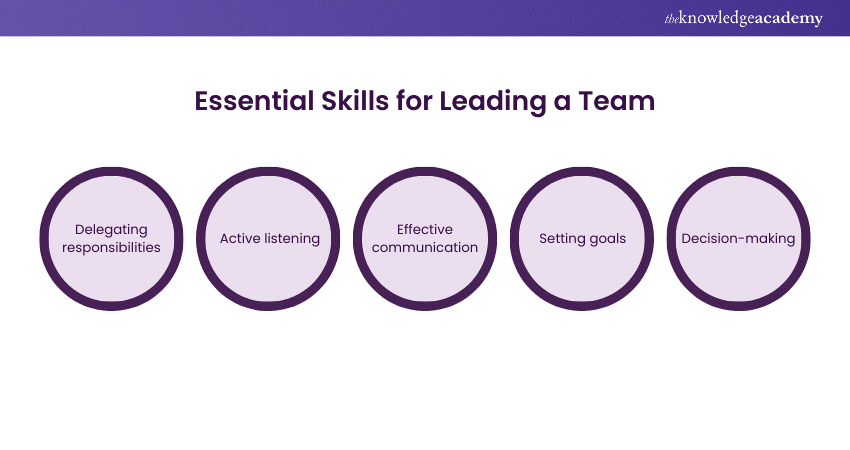We may not have the course you’re looking for. If you enquire or give us a call on 01344203999 and speak to our training experts, we may still be able to help with your training requirements.
Training Outcomes Within Your Budget!
We ensure quality, budget-alignment, and timely delivery by our expert instructors.

Team Leadership is the art of guiding and leading a group of individuals to achieve an organisation's common goals and objectives. In a world where collaboration defines success, the absence of robust Team Leadership Skills can lead to organisational challenges.
These skills aim to equip you with the knowledge necessary to inspire, empower, and guide your team toward excellence. If you are interested in developing the 15 essential Team Leadership Skills, then this blog is for you!
Table of Contents
1) What is Team Leadership?
2) Why is Team Leadership required?
3) 15 Essential Skills for Leading a Team
a) Delegating responsibilities
b) Active listening
c) Building trust
d) Effective communication
e) Personal accountability
f) Articulating vision
g) Fostering positivity
h) Setting goals
i) Continuous learning
j) Self-awareness
4) Conclusion
What is Team Leadership?
Team Leadership refers to the ability to guide, motivate and coordinate a group of individuals towards achieving common goals and objectives. A Team Leader is responsible for setting direction, clarifying expectations and facilitating collaboration among team members to maximise performance and productivity.
Why is Team Leadership required?
In today’s business landscape, Team Leaders and middle managers face complex Leadership challenges. Team Leaders play a key role in achieving certain objectives to maintain the quality of operations and promote continuous company growth. Effective Team Leaders interact positively with their team members, motivate them to achieve common goals and maintain productivity.

In the ever-evolving business landscape, Team Leadership Skills is a cornerstone for achieving success and driving impactful change. It embodies the ability to inspire, empower, and guide individuals and teams towards shared goals and aspirations. Here are the essential skills for leading a team:
1) Delegating responsibilities
Delegating Responsibilities means encouraging your team members to take responsibility and accountability for their work. The Team Leader's role also includes delegating tasks to team members as per their capability and skills. Delegation saves time and lowers stress levels for the entire team. Also, the decision-making process of delegation shows confidence in your team members.
2) Active listening
Active listening requires presence, patience and practice. Active listening can encourage effective communication between you and your teammates. As a Leader, it exhibits your interest in the listener's views, helps you to earn trust and enables you to understand your team's issues.
3) Building trust
Establishing trust in Team Leadership requires constant honesty, reliability, and transparency. Leaders must demonstrate integrity by keeping promises, admiring mistakes, and valuing team members' input. Open communication, empathy and active listening encourage a culture of respect and mutual understanding.
Building trust is facilitated by helping, acknowledging success and standing up for the group's needs. While maintaining confidentiality fosters trust in delicate situations, consistency in behaviour and decision-making strengthens dependability.
4) Effective communication
To effectively lead a team, goals and expectations feedback must be stated clearly. Empathy and understanding can develop among team members through active listening. To make sure that everyone is heard and valued, Leaders should modify their communication style to fit a variety of personalities and contexts.
Transparency and trust develop honesty among team members, allowing for communication and exchanging ideas. Brief and timely updates keep everyone informed and working towards the same goals. Good communication promotes teamwork, builds a positive culture within the team and improves performance and productivity.
5) Personal accountability
In Team Leadership, personal accountability involves accepting accountability for one’s choices, decisions and results within the team environment. It involves taking responsibility for one’s actions, growing from them, and proactively seeking solutions.
By modelling personal accountability, a Leader encourages team members, motivating them to take responsibility for their contributions and work. Leaders who take responsibility for their actions set a good example for their team members.
6) Articulating vision
Articulating vision to your team members is very important. If you don’t articulate your vision to team members, they will struggle to know how their contribution will achieve a common goal of their organisation.
Create a small point of your vision’s strategy so that your team members can easily understand your vision. Talk to your employees in a meeting and discuss your vision for the business. Encourage them to discuss if they still have any questions.
Join our Technical Team Leading Training to enhance your Skills in Team Leadership!
7) Fostering positivity
Fostering positivity is important in Team Leadership, as it creates an environment where team members feel valued, motivated and engaged. Leaders can cultivate positivity by celebrating achievements, recognising individual contributions and promoting a culture of appreciation and gratitude. Encouraging open communication and active listening also fosters positivity.
8) Setting goals
Team Leadership goals are well-described objectives; by setting goals, you can improve your skills as a Team Leader. Developing Team Leadership Skills starts with a clear understanding of your goals. Before starting on the journey of Team Leadership Skills, it’s important to think about what you want to achieve. Effective Leaders know the significance of setting smart goals that match their vision.
9) Continuous learning
Effective Leadership in this ever-evolving business landscape demands a dedication towards continuous learning. Continuous learning improves your problem-solving skills and upgrades emotional intelligence by increasing self-awareness and appreciation. Leaders who can understand their team members' emotions are those who manage conflicts and inspire and motivate their team members.
10) Self-awareness
Self-awareness is about recognising our personalities, emotions and skills. It helps to know your strengths and weaknesses and improves your interpersonal skills. Self-awareness is important for making strategic decisions.
Additionally, self-aware Team Leaders can understand the perspectives and emotions of their teammates. This helps to build healthy relationships between Team Leaders and teammates and creates a positive environment.
11) Thinking strategically
Effective Team Leadership requires strategic thinking. This involves anticipating future trends, identifying opportunities, and making informed decisions. These actions should align with the organisation's goals and objectives.
Leaders who think strategically take a holistic view of the business landscape, considering internal and external factors that may impact the organisation’s success. They analyse market dynamics, competitive threats and industry trends to identify strategic priorities and allocate resources effectively.
Join our Creative and Analytical Thinking Training to enhance your analytical thinking skills!
12) Adaptability
Adaptability in terms of Team Leadership is the ability to adjust and thrive in response to changing circumstances, environment, and team dynamics. Effective Team Leaders recognise that no two situations are alike and understand the importance of flexibility in navigating challenges and seizing opportunities. They are open to new ideas, willing to experiment with different approaches, and quick to pivot them as necessary.
13) Decision-making ability
Decision-making is one of the major skills in every Team Leader’s journey. As a Team Leader, you should involve your team members while making decisions. Strategic decision-making needs Leaders to analyse facts presented in a situation. To develop decision-making skills, Leaders must be aware of, have control over, and communicate their emotions in a healthy manner.
14) Optimistic outlook
Leaders who maintain an optimistic perspective see challenges as opportunities for growth. They communicate hope, positivity and a belief in teams' ability to overcome adversity, which motivates team members to be persistent and excel. Optimistic Leaders cultivate a supportive and encouraging work environment where creativity flourishes.
15) Conflict resolution skills
Conflict resolution skills are important Leadership Skills that involve addressing disagreements and encouraging collaboration. Effective Leaders facilitate open communication and actively listen to all perspectives.
Improve your Ethical Leadership Skills with our Ethical Leadership Training!
Conclusion
Effective Team Leadership is the foundation of high-performing teams and organisational success. It empowers individuals to unleash their full potential, making a meaningful impact on organisations and communities. Best of luck on your Leadership journey!
Frequently Asked Questions

Vision, integrity, empathy, good communication, and decision-making are the five qualities of a good Leader.

To enhance your Team Leadership Skills, focus on communication, empathy, and fostering a collaborative environment. Invest in training, seek mentorship, and actively solicit feedback. Continuous self-reflection and a commitment to personal growth are key to becoming an effective Team Leader.

The Knowledge Academy takes global learning to new heights, offering over 30,000 online courses across 490+ locations in 220 countries. This expansive reach ensures accessibility and convenience for learners worldwide.
Alongside our diverse Online Course Catalogue, encompassing 17 major categories, we go the extra mile by providing a plethora of free educational Online Resources like News updates, Blogs, videos, webinars, and interview questions. Tailoring learning experiences further, professionals can maximise value with customisable Course Bundles of TKA.

The Knowledge Academy’s Knowledge Pass, a prepaid voucher, adds another layer of flexibility, allowing course bookings over a 12-month period. Join us on a journey where education knows no bounds.

The Knowledge Academy offers various Leadership Courses, including Leadership Skills Training, Successful People Management and Team Leadership and Creative and Analytical Thinking Training. These courses cater to different skill levels, providing comprehensive insights into Leadership Qualities.
Our Business Skills Blogs cover a range of topics related to Leadership, offering valuable resources, best practices, and industry insights. Whether you are a beginner or looking to advance your Leadership Skills, The Knowledge Academy's diverse courses and informative blogs have you covered.
Upcoming Business Skills Resources Batches & Dates
Date
 Introduction to Supervising a Team
Introduction to Supervising a Team
Fri 10th Jan 2025
Fri 14th Mar 2025
Fri 9th May 2025
Fri 11th Jul 2025
Fri 12th Sep 2025
Fri 14th Nov 2025







 Top Rated Course
Top Rated Course



 If you wish to make any changes to your course, please
If you wish to make any changes to your course, please


